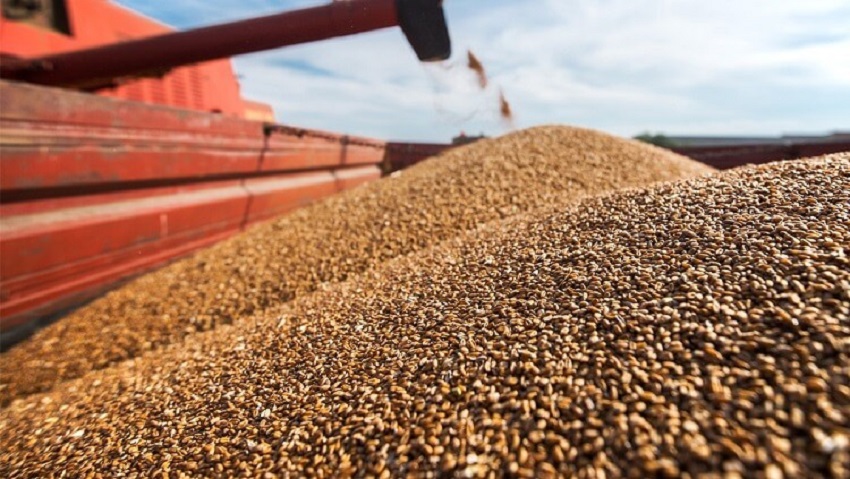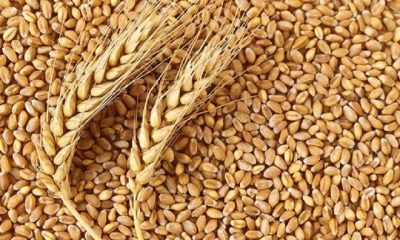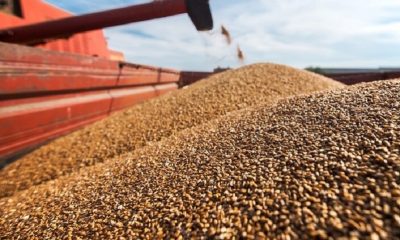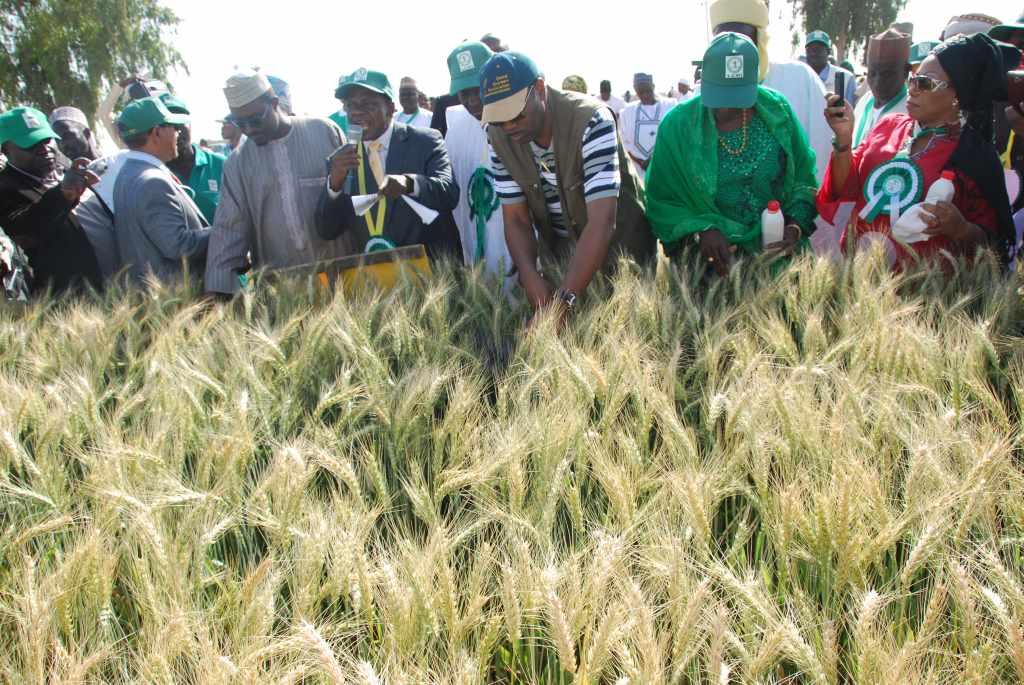Economy
Stakeholders Identify Reason for Local Wheat Production Shortage

By Modupe Gbadeyanka
Stakeholders in the wheat value chain have identified one of the reasons for the shortage of production of the commodity in Nigeria.
They said the inability of smallholder farmers to have access to high-yielding-seed varieties was making it difficult for producers to meet domestic demand for wheat in the country.
If this problem persists, they warned that Nigeria may not achieve self-sufficiency and drastically reduce the importation of wheat by 60 per cent over the next two years as targeted by the Central Bank of Nigeria (CBN).
There is a need for a concerted effort by the government and other critical stakeholders within the wheat value chain to galvanize and aggressively drive the wheat development programmes in the country, they submitted.
Wheat is used in producing staple foods such as semolina, bread, noodles and pasta, which form a regular part of meals in most urban and rural households in the country.
The importance of wheat foods to the national population, therefore, underscores the need to develop the domestic wheat value chain which currently is not delivering enough to meet the growing demand for wheat derivatives; hence, the need for interventions from the government at different levels and other stakeholders in the wheat value chain to address the challenges in promoting local wheat production in Nigeria.
As it stands, increasing the total yield per hectare of national farmlands is critical to reaching food sufficiency levels that will meet the needs of over 200 million Nigerians.
In deepening the impact of the wheat development programme, the Flour Milling Association of Nigeria to which Crown Flour Mill is a major contributor to is also working with the Lake Chad Research Institute (LCRI) in Maiduguri and the Institute for Agricultural Research (IAR) at the Ahmadu Bello University, to train local smallholder farmers on the latest agronomic practices.
The expanded wheat development efforts are yielding impressive results. Smallholder farmers that are participating in the FMAN wheat development programmes have shown remarkable technical improvement that is matched by impressive feedbacks and output.
A delegation from Olam, the parent company of CFM, travelled to Jigawa after participating in a wheat development webinar programme organized by the agribusiness conglomerate in Abuja, farmers attested to the impact of the high level of support provided by the millers’ association and its partners.
One of the wheat farmers remarked, “We were advised to plant at a particular time to get the best yield possible but I insisted on doing things my way. It nearly cost me the season, but I came back to the (FMAN) team for assistance and this time around, I heeded their advice and the result was unbelievable.”
Expatiating on CFM’s wheat development support drives, Ashish Pande, the Managing Director of the wheat milling firm said, “Our commitment to research and development is the key to why we’ve been successful as an organization over the years and have been able to consistently create better quality, safe, great-tasting and more reliable food produce/products which meet our customers’ needs and improve the livelihoods of our farmers.”
Despite having access to a large expanse of farming lands in places such as Borno, Bauchi, Yobe, Kano, Jigawa and Zamfara States, smallholder wheat farmers have not been able to meet domestic consumption demand for wheat.
It is apparent that without removing the seed-variety barrier, the acute shortage of locally produced wheat will persist. Whereas this would necessitate the continued reliance on wheat importation to bridge the widening domestic production-consumption gap, it does not portend well for national food security.
The economic and social costs of relying on wheat importation are enormous. While the foreign exchange is being sourced by local wheat millers to import the crop to meet national consumption demand, the exchange position of the local currency is affected and precious employment opportunities that could be generated by smallholder farmers if harvest reaches full capacity, are also lost.
Stressing the need to remove the seed variety barrier to improved domestic wheat production, Mohammed Salim, president of the Wheat Farmers Association of Nigeria (WFAN) said, “One of our challenges is getting quality seeds every two years. Wheat is an open-pollinated crop and the maximum you can do with a particular seed is four years or thereabout. So, if the government can finance the research institutes to come up with new varieties every two years, that will sustain production and keep the farmers in business.”
Going by this insight by Salim, providing sufficient finance to fund local research institutes to develop new seed varieties for local farmers biennially is key to bridging the domestic production-consumption gap in the wheat value chain.
However, Crown Flour Mill Limited (CFM), a subsidiary of the Olam Group and makers of the Mama Gold flour brand, in collaboration with other members of the Flour Milling Association of Nigeria (FMAN), is leveraging its agro experience, extensive industry network and deep investment portfolio to aggressively support the domestic agro research institutes to drive innovation and make high-yielding seed varieties available to local wheat farmers. The investment and innovative approach form a bold new drive to raising local wheat production levels while keeping smallholder farmers in business, as suggested by Salim.
As part of the collaborative approach to making high yielding seed varieties available to local wheat farmers, CFM, alongside other contributors and partners at the milling association, under the Certified Seed Production Programme, have established a research farm to nurture the seed varieties it brought into the country from the International Maize and Wheat Improvement Centre (CIMMYT) in Sudan and Mexico. These efforts add to an ongoing partnership that the millers are implementing with various seed production companies comprising Rahama Seed, Greenspore and Premier seed.
In the coming months, the massive partnership network is expected to lead to the distribution of 150 tons of wheat seeds to around 3,000 smallholder farmers in Nigeria.
The deliberate wheat development programmes embarked upon by CFM and others under the auspices of the flour milling association, when fully optimized, will no doubt reduce the high dependence on imported wheat. It will also reduce the foreign exchange wheat import bill while boosting the national economic diversification agenda.
In the end, the Nigerian consumers are going to be the real beneficiaries of the increasing level of the various interventions and wheat development programmes undertaken by CFM and other leading millers. The consumers will continue to have access to their most cherished wheat foods such as semolina, pasta, noodles and bread at the right quality, quantity, nutritional value and most affordable shelf price.
Economy
Seven Price Gainers Boost NASD OTC Bourse by 2.19%

By Adedapo Adesanya
Seven price gainers flipped recent declines at the NASD Over-the-Counter (OTC) Securities Exchange, raising the alternative stock market by 2.19 per cent on Friday.
According to data, the market capitalisation added N51.24 billion to end N2.389 trillion compared with the previous day’s N2.338 trillion, while the NASD Unlisted Security Index (NSI) climbed 85.65 points to close at 3,994.32 points, in contrast to the 3,908.67 points it ended a day earlier.
Business Post reports that the advancers were led by MRS Oil Plc, which improved its value by N13.00 to N200.00 per share from N187.00 per share, FrieslandCampina Wamco Nigeria Plc gained N7.40 to settle at N91.55 per unit versus the previous day’s N84.15 per unit, Central Securities Clearing System (CSCS) Plc appreciated by N6.08 to N71.00 per share from N64.92 per share, Afriland Properties Plc added 66 Kobo to finish at N17.17 per unit versus N16.51 per unit, IPWA Plc rose 37 Kobo to N4.15 per share from N3.78 per share, First Trust Mortgage Bank Plc grew by 11 Kobo to N1.20 per unit from N1.09 per unit, and Food Concepts Plc went up by 10obo to N3.70 per share from N3.60 per share.
On the flip side, there were two price losers led by Geo-Fluids Plc, which depreciated by 28 Kobo to N3.32 per unit from N3.60 per unit, and Industrial and General Insurance (IGI) Plc dropped 5 Kobo to sell at 45 Kobo per share from 50 Kobo per share.
Yesterday, the volume of trades went down by 92.0 per cent to 3.7 million units from 45.8 million units, the value of transactions fell by 59.4 per cent to N84.5 million from N208.2 million, while the number of deals went up by 7.7 per cent to 42 deals from 39 deals.
CSCS Plc remained the most traded stock by value (year-to-date) with 32.6 million units exchanged for N1.9 billion, trailed by Geo-Fluids Plc with 119.6 million units valued at N470.3 million, and Resourcery Plc with 1.05 billion units traded at N408.6 million.
Resourcery Plc closed the day as the most traded stock by volume (year-to-date) with 1.05 billion units sold for N408.7 million, followed by Geo-Fluids Plc with 119.6 million units worth N470.3 million, and CSCS Plc with 32.6 million units worth N1.9 billion.
Economy
FX Demand Worries Weaken Naira to N1,346/$1 at Official Market

By Adedapo Adesanya
The Naira weakened further against the United States Dollar in the Nigerian Autonomous Foreign Exchange Market (NAFEX) on Friday, February 20, by N4.97 or 0.37 per cent to N1,346.32/$1 from the N1,341.35/$1 it was transacted on Thursday.
Heightened FX demand tilted the market toward the downside yesterday, exerting upward pressure on rates despite efforts by the Central Bank of Nigeria (CBN) to stabilise the foreign exchange market.
Also in the official market, the domestic currency depreciated against the Pound Sterling during the session by N9.39 to sell for N1,815.25/£1 versus the previous day’s N1,805.86/£1, and lost N7.33 against the Euro to close at N1,584.62/€1 compared with the preceding session’s N1,577.29/€1.
The story was not different for the Nigerian Naira at the GTBank FX desk, where it depleted against the Dollar by N7 on Friday to quote at N1,356/$1 versus the N1,349/$1 it was sold a day earlier, but remained unchanged in the black market at N1,370/$1.
It was observed that risky sentiment among Foreign Portfolio Investors (FPIs) contributed to the FX market, amid fears of hot money flight due to capital gains tax and other factors.
As for the cryptocurrency market, it was mostly green yesterday in reaction to a Supreme Court verdict dismissing a fresh 10 per cent global levy by President Donald Trump.
The apex court on Friday described Mr Trump’s global tariff rollout as illegal. The decision did not clarify what should happen to tariff revenue already collected, and it doesn’t necessarily spell the end of the trade agenda, with multiple legal and executive avenues still available.
Litecoin (LTC) grew 2.7 per cent to $55.00, Cardano (ADA) appreciated 2.6 per cent to trade at $0.2815, Binance Coin (BNB) expanded by 2.6 per cent to $627.19, Dogecoin (DOGE) recouped 1.3 per cent to quote at $0.1, Ripple (XRP) jumped 0.7 per cent to $1.43, Solana (SOL) improved by 0.5 per cent to $84.15, and Ethereum (ETH) soared 0.1 per cent to $1,962.78.
However, Bitcoin (BTC) lost 0.2 per cent to sell for $67,850.49, while the US Dollar Tether (USDT) and the US Dollar Coin (USDC) traded flat at $1.00 each.
Economy
Fidson, Jaiz Bank, Others Keep NGX in Green Territory

By Dipo Olowookere
A further 0.99 per cent was gained by the Nigerian Exchange (NGX) Limited on Friday after a positive market breadth index supported by 53 price gainers, which outweighed 23 price losers, representing bullish investor sentiment.
During the trading day, the trio of Jaiz Bank, Fidson, and NPF Microfinance Bank chalked up 10.00 per cent each to sell for N11.00, N86.90, and N6.27, respectively, while Deap Capital appreciated by 9.96 per cent to N7.62, and Mutual Benefits increased by 9.94 per cent to N5.42.
Conversely, Secure Electronic Technology shed 10.00 per cent to trade at N1.62, Sovereign Trust Insurance slipped by 9.73 per cent to N2.32, Ellah Lakes declined by 7.91 per cent to N12.80, International Energy Insurance retreated by 5.56 per cent to N3.40, and ABC Transport moderated by 5.26 per cent to N9.00.
Data from Customs Street revealed that the insurance counter was up by 2.52 per cent, the industrial goods sector grew by 2.28 per cent, the banking space expanded by 1.43 per cent, the consumer goods index gained 1.23 per cent, and the energy industry rose by 0.05 per cent.
As a result, the All-Share Index (ASI) went up by 1,916.20 points to 194,989.77 points from 193,073.57 points, and the market capitalisation moved up by N1.230 trillion to N125.164 trillion from Thursday’s N123.934 trillion.
Yesterday, investors traded 820.5 million stocks valued at N28.3 billion in 63,507 deals compared with the 898.5 million stocks worth N38.5 billion executed in 61,953 deals, showing a jump in the number of deals by 2.51 per cent, and a shortfall in the trading volume and value by 8.68 per cent and 26.49 per cent apiece.
Closing the session as the most active equity was Mutual Benefits with 79.0 million units worth N427.1 million, Zenith Bank traded 44.0 million units valued at N3.8 billion, Chams exchanged 43.9 million units for N182.0 million, AIICO Insurance transacted 42.4 million units valued at N179.8 million, and Veritas Kapital sold 36.0 million units worth N90.6 million.
-

 Feature/OPED6 years ago
Feature/OPED6 years agoDavos was Different this year
-
Travel/Tourism10 years ago
Lagos Seals Western Lodge Hotel In Ikorodu
-

 Showbiz3 years ago
Showbiz3 years agoEstranged Lover Releases Videos of Empress Njamah Bathing
-

 Banking8 years ago
Banking8 years agoSort Codes of GTBank Branches in Nigeria
-

 Economy3 years ago
Economy3 years agoSubsidy Removal: CNG at N130 Per Litre Cheaper Than Petrol—IPMAN
-

 Banking3 years ago
Banking3 years agoSort Codes of UBA Branches in Nigeria
-

 Banking3 years ago
Banking3 years agoFirst Bank Announces Planned Downtime
-

 Sports3 years ago
Sports3 years agoHighest Paid Nigerian Footballer – How Much Do Nigerian Footballers Earn


















